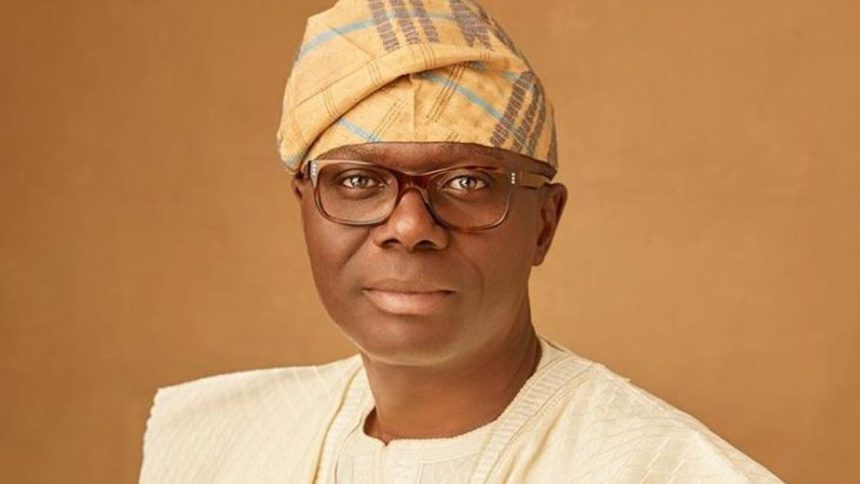Gov. Babajide Sanwo-Olu of Lagos State has urged the private sector to take a stronger, more coordinated role in driving the successful implementation of the African Continental Free Trade Area (AfCFTA).
Sanwo-Olu, who made the call at the NEPAD Business Group Nigeria High-Level Business Forum, held on Thursday in Lagos, said that the agreement holds the key to transforming Africa into a globally competitive economic powerhouse.
The theme of the forum is “Mobilising Africa’s Private Sector for AfCFTA Towards Africa’s Economic Development Amid Global Uncertainty”.
It brought together policymakers, business leaders, and development experts from across the continent.
Sanwo-Olu was represented by the Lagos State Commissioner for Commerce, Cooperatives, Trade and Investment, Mrs Folashade Ambrose-Medebem.
The governor said AfCFTA had the potential to lift millions of Africans out of poverty, but only if the continent’s business community seized the opportunity to scale production and integrate value chains across borders.
“Governments can negotiate tariffs and treaties, but businesses must produce, export, invest, and believe in cross-border possibilities
“The private sector is the true engine of trade and industrialisation; without it, AfCFTA will remain a document and not a driver of development,” Sanwo-Olu said.
He noted that Lagos State had continued to create an enabling business environment through deliberate investments in infrastructure, logistics and technology, all designed to enhance productivity and trade efficiency.
“From our vibrant tech ecosystem in Yaba to the Lekki Deep Sea Port and the expanding industrial corridors of the state, we are building a Lagos that supports trade, innovation, and investment,” he added.
The governor stressed the need to empower Small and Medium Enterprises (SMEs), which he described as “the lifeblood of Africa’s economy”.
He said access to finance, mentorship, and digital tools remained essential for their growth.
“Through the Lagos State Employment Trust Fund (LSETF), we have supported thousands of entrepreneurs with training and access to funding.
“When SMEs thrive, our communities grow, jobs are created, and the promise of AfCFTA becomes real,” Sanwo-Olu noted.
In his goodwill message, Dr Abdulrashid Yerima, President of the Nigerian Association of Small and Medium Enterprises (NASME), called on African governments to align policy frameworks with the realities of the private sector to ensure the success of AfCFTA.
Yerima said Africa’s shared prosperity depended on how effectively the continent could mobilise its entrepreneurs and innovators to take advantage of the 1.4 billion-strong continental market.
“As private sector leaders, the employers of labour and creators of opportunity, we must move from aspiration to achievement, from potential to performance.
“AfCFTA is not just an agreement; it is Africa’s blueprint for collective economic independence,” he said.
He emphasised the importance of strengthening cooperation among business coalitions, cooperatives, and industrial clusters to ensure that micro and small enterprises benefit from cross-border trade opportunities.
“No SME can scale alone in a continental market.
“We must build strong business networks that allow small enterprises to grow into regional champions,” he stressed.
Yerima further encouraged African nations to adopt global best practices and digital frameworks, such as the OECD Digital for SMEs (D4SME) initiative, to improve access to knowledge, technology, and markets.
Also speaking at the event, Mr Samuel Dossou-Aworet, President of the African Business Roundtable (ABR), urged African leaders to fully harness AfCFTA’s opportunities to build inclusive and sustainable economies.
Dossou-Aworet noted that while Africa was currently the world’s second-fastest-growing region after Asia, sustained growth would require greater industrialisation and investment in human capital.
“The entry into force of the AfCFTA has expanded Africa’s investment frontiers. Where once our markets were fragmented, we now have a unified platform for trade and production.
“But growth must be inclusive, not just in numbers, but in impact on people’s lives,” he noted.
Citing data from the African Development Bank (AfDB), Dossou-Aworet observed that 12 of the world’s 20 fastest-growing economies in 2025 are African, including Rwanda, Côte d’Ivoire, and Senegal.
However, he cautioned that Africa’s GDP growth of around four per cent remained below the seven per cent threshold needed to significantly reduce poverty.
“We must ensure that growth translates into better jobs, infrastructure, and access to opportunities for women and youth,” he stressed.
He also called for innovative financing models to bridge Africa’s infrastructure gap and improve competitiveness in the global market.
“Africa needs market access and trade facilitation mechanisms to enable its products to reach global markets.
“Access to affordable capital is key, and our financial systems must evolve to support trade,” he added.
Dossou-Aworet reaffirmed the African Business Roundtable’s commitment to supporting enterprise development and promoting Africa as a prime destination for investment.
“This is Africa’s moment.
“If we work together, government, business, and citizens, we will build an Africa that competes confidently in the global economy and delivers prosperity for its people.”
The forum, convened by the NEPAD Business Group Nigeria, brought together regional and international partners to strengthen collaboration between public and private sectors in advancing AfCFTA’s goals.
Chairman of the group, Chief J.K. Randle, commended the participation of leading business executives and policymakers, saying it reflected Africa’s readiness to take ownership of its economic destiny.
Randle said, “We can no longer rely on external forces to drive our growth.
“The private sector must rise as the torchbearer of Africa’s transformation under AfCFTA.”
He added that the forum would continue to serve as a platform for dialogue, knowledge exchange, and action planning to position African enterprises at the centre of global trade.



